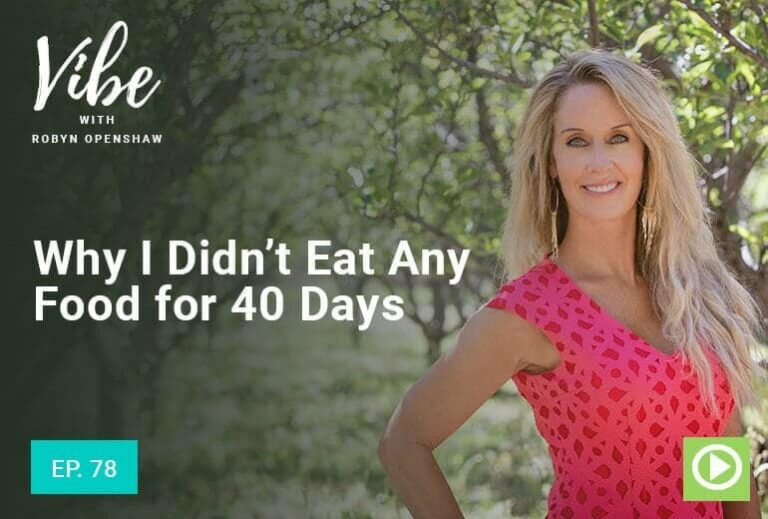Ep.78: Why I Didn’t Eat Any Food for 40 Days

Podcast: Play in new window
Today I am talking to you about my recent experience with fasting. I’ve just returned from a seven-day fast. It’s my fourth long-term water fast that I’ve done in the last two years. I’m going to share with you why I do it, what my experience was like, whether I suggest it, and how you can even get the same benefits without going totally without food. This time, I had some symptoms that I’ve had before, and I had some additional symptoms that I have never had before. So, I’m going to tell you the good, the bad, and the ugly. Fasting is being talked about more and more so lets continue the conversation.
LINKS AND RESOURCES:
Check out the free Detox Video Masterclass!
TRANSCRIPTION:
Robyn: Hey, it’s Robin Openshaw here, and welcome back to Vibe. Today I am talking to you about my recent experience with fasting. It’s my fourth long-term water fast that I’ve done in the last two years. I’m going to tell you a little bit about why I do it.
I’m going to tell you about what my experience was like, whether I suggest anyone else should do what I did, how you can maybe get the same benefits without going completely and totally without food, without anything besides water. I’ve done it now for seven days twice. I’ve done it for nine days, and the longest one I did was for 12 days, where I was not actually eating any food.
Fasting is being talked about so much out there, and I think it’s primarily because the reigning diet at the moment is the ketogenic diet, which has a fasting component. I don’t like much about the ketogenic diet; I do like the fasting component. I do think that we have really lost the art of just going without food sometimes. Americans don’t do that.
I think, every time, a pendulum swings; in this case, our massive overeating in North America in recent decades, just because food is ubiquitous. It’s cheap. You can get it anywhere. You don’t have to make any effort for it, like you used to. We used to be hunter-gatherers, or in agrarian economies, where we had to grow it, and store it against the winter. We’ve got this pendulum [swing] over into overeating, and just an excess of food in general. That pendulum has to swing back, and I think that’s another reason why people are really curious about the idea of fasting.
I think most people are terrified of it. I think skipping a meal now and then, maybe even often, is a fantastic idea, even if I disagree with the ketogenic diet concepts of peeing on a stick, and obsessing about your level of ketones in the urine, and putting your body into unnatural states to manipulate the metabolic system, and overeating saturated animal fats. I may disagree with all of those things. Plus, I don’t think it’s a sustainable diet, nor do I think it’s a nutrient-dense diet.
I do like the fasting, and I like the emphasis on fasting, and the conversations that people in health and wellness and nutrition are having with our audiences about it. I literally am recording this on a Thursday, and I’ve just returned this past Sunday from a seven-day fast. This time, I had some symptoms that I’ve had before, and I had some additional symptoms that I’ll tell you about that I have never had before. I’m going to tell you the good, the bad, and the ugly.
I do want to say that so many people, when I did a couple of Facebook lives (I did one on day four, and one on day eight, right after I had broken my fast, had breakfast, and was headed to the airport) [had a lot to say]. In the car, I had a driver, and I was talking about it in the car. People kept saying, “Oh, I’ve been fasting, too,” and their definition of fasting was what the keto diet people are calling intermittent fasting. I do not consider the space between dinner and breakfast to be any kind of fasting.
Some people might call it time-restricted eating, where people who have been eating constantly from the minute they wake up till the minute they go to bed maybe stop doing that, but I do not consider that to merit the word fasting at all, so we’re just going to dismiss the idea of intermittent fasting. If you’re going to do intermittent fasting, we might refer to it as alternate day fasting, where maybe you go a day, every other day for a while.
That’s certainly a lot easier to do than what I just did; I didn’t even have a cup of tea for seven days. I literally had only water. Only in modern America have people not fasted. Over time, most people have done long-term fasts as a sign of obedience or humility before God, and there have been spiritual purification reasons. The health benefits have not been primary, and I think now America and the developed world are looking at fasting from the vantage point of, “What do we get from it, in terms of health benefits?”
Most of the fasting that has occurred in the world has been accidental, because people didn’t have access to food for long periods of time. There are people who have gone weeks and even months without food. My mild obsession with fasting really relates to my obsession with the idea of autophagi. It is spelled a-u-t-o-p-h-a-g-i, pronounced autophagi. I’m really fascinated by centenarian research, and how people in communities around the world live to be over 90 routinely, and over 100 at 20 to 30 times the rate that we here in the modern US do.
I’m really interested in the fact that, when you go study the blue zones, when you follow another recent podcast guest of mine, Jason Proll, who went all over the world researching these blue zones, learning what these people do, none of them do anything like what the big fad diets are doing. The paleo diet and the keto diet are the big diets out there. Not only are they inferior as ways to lose weight, but they don’t really have anything to do with what paleolithic man was eating, okay?
Mammoth meat went extinct a long time ago. None of the plants that they were eating back then are even available to us now. Things that people eat, flying under the banner of paleo, aren’t even things that paleolithic man had access to. Plus, it makes no sense to me on the level of, why do we want to make paleolithic man our heroes in terms of health and wellness? That doesn’t really make any sense to me. There’s no real data there. They mostly lived to be in their thirties, at the most, so we have no idea if what they were doing would have led to long life, because they mostly died of the elements, and predators.
Zero of the centenarian populations eat rancid fish oil pills. Zero of them are obsessed with eating massive amounts of protein, and eat processed, fake protein powder in a Mylar bag. Zero of them eat a ketogenic diet, where they’re eating 70% fats, and very, very little carbohydrates. All of them, actually, eat high carbohydrates. They’re just eating whole foods; there’s a few tidbits of what we do know about populations who live to be over 100.
Just a couple points, because we can’t be comprehensive here — there’s actually a lot of fascinating things that we learn about studying these long-living populations of the world, but Okinawans are one of the most interesting, I think, of the five blue zones cultures of the world. One of the things that’s interesting about Okinawans is that there’s this huge population who have lived to be over 100, but when you look at their grandchildren, their grandchildren are getting diabetes and are overweight at about the same rate that Americans are.
The benefits have completely dropped off, and it appears that the reason why is that they have lots of fast food now in Okinawa where the population centers are, and where the grandchildren of these centenarian Okinawans live. When they interviewed these elderly Okinawans, they find that most of them have never eaten out of a drive-through. Most of them have never eaten fast food. Another thing that’s really interesting to me about this particular blue zone is that post-World War II, this population was in extreme poverty.
Their soil did not produce well. It was hard to grow anything. I know they tried to grow quinoa. I think they tried to grow buckwheat. They tried to grow a bunch of different grains, or quasi-grains, and vegetables. Their crops just got wiped out over, and over, and over again, and then finally, someone imported sweet potatoes. And they found that their soil would grow sweet potatoes really prolifically. They did well, and these Okinawans who are now over 100 had somewhere from 60 to 80% of their calories come from sweet potatoes for literally decades.
Many of them ate mostly sweet potatoes for up to 50 years, so this kind of flies in the face of some other food fads, like the food fad that you have to constantly be increasing the diversity in your diet because your body will get too used to foods, and it’ll start becoming reactive to foods. Not according to the blue zones. The Okinawans especially, but also in the Nicoyan Peninsula in Costa Rica. These people ate like five foods their entire lives, so another thing that comes to mind when I think about fasting, and the link to longevity, are people who were calorie-suppressed for many, many years.
I’m not suggesting that you should be on a calorie-suppressed diet. It’s almost impossible when you can just walk over to your fridge, and there’s food at all times. People who are calorie-suppressed usually aren’t choosing to do that, right? But just anecdotally, I want to mention the book Unbroken. Have you ever read it? It’s by Laura Hillenbrand. I want to mention her, too, and her fascinating story, but Unbroken is the story of Louis Zamporini, an Olympic runner.
He was called to World War II, where he went down in the Atlantic in his rickety old airplane. His plane crashed into the Atlantic, and he floated for something like 45 days, if I recall, in the Atlantic. One of his two colleagues who was with him died in the boat, and had to be put under the water. When they were rescued, they were actually rescued by the enemy, and they were in Japanese concentration camps for four and a half years with little or no food. Imagine, four and a half years; they were in hard labor, and some of that time, they were in situation of terrible deprivation, cold, with hardly anything to wear.
He was volunteering at one point to do the laundry, and to iron clothes for the Japanese infantry who had imprisoned him, because he could spray the starch on the clothes, and then put some on his finger and lick it to get 30 calories a day. That’s the kind of deprivation he lived in. The book itself is amazing. It’s a runaway New York Times bestseller.
Between Unbroken and Seabiscuit, which are both written by Laura Hillenbrand, she has sold 13 million copies. Both of them have been made into major motion pictures. If you didn’t read the book, you probably saw one or both of those movies. They’re both outstanding movies as well; the story of Louis Zamporini is incredibly inspirational, and I often wonder about him and other war veterans who spent years in massively calorie restricted situations, because guess what? Louis Zamporini just died at age 97. If you think going without food puts you at higher health risk, what if the opposite is true?
What if going without food lets your body do some significant work? That’s what autophagi is. Translated, autophagi means self-eating. When we don’t eat for a period of time, our body actually consumes, breaks down, metabolizes, and burns broken parts in an elemental way. Since I’ve mentioned Unbroken the book, an incredible read about Louis Zamporini, the former Olympic runner, and World War II hero veteran, I also want to mention Laura Hillenbrand, the author.
She developed chronic fatigue syndrome. Didn’t know what she had, but when she was 19 years old, she was in college. She had been a competitive athlete in high school. I’m also kind of obsessed with her, because get this: her health broke down when she was 19 years old, and she has been in bed ever since. She’s my age, okay, so she’s like 50 years old, and she literally could not ride in a car for 30 years. She never met Louis Zamporini. She wrote the story of his life, and he died without her ever meeting him.
She’s never been on a book tour because she literally can’t leave home. That’s how sick she is, so the whole thing is fascinating to me: the story of Louis Zamporini, but also the story of Laura Hillenbrand, and how the two of them worked together, but from a distance, and never met each other. I think Zamporini died a couple of years ago; I hope you enjoy his story if you never have, but Laura Hillenbrand is a bit of an inspiration to me as well. Not because I’m ill, but because of what someone can accomplish when they put their mind to, and they become passionate about it. Even though she literally can’t leave her bed, she wrote two incredible, bestselling books.
I interviewed Dr. Valter Longo, one of the world’s (as he calls it) “juventology experts,” where he studies what keeps us young until we’re 100, and what causes us to age quickly. He is also one of the world’s experts on fasting, but when I interviewed him – and I had heard him on a couple other interviews – he’s become increasingly negative about the actual practice of fasting.
That was curious to me, because a few years ago, that was not the case. He was very much in favor of it. He talks about lots of research, including for multiple sclerosis, where the myelin sheath regenerates in the nervous system. Medicine has nothing to offer people with multiple sclerosis and other neurodegenerative diseases. They can sort of help with symptoms, but they don’t have anything to actually repair the problem. He talks about reversing diabetes with fasting, and long-term benefits of a short-term fast.
I didn’t know if, maybe, he has become kind of negative on fasting because he’s promoting his diet now, which is a fasting-mimicking diet to do some things that dramatically decrease calories but allows people to continue to eat, and he wants to promote it. That might be why he’s negative about it. Probably more likely, he doesn’t want to be exposed to the potential legal ramifications; if he’s talking about the health benefits of fasting, and then someone fasts for a month, two months, and has some adverse reactions or even dies.
People have died when fasting, so I dug deep on the internet on the dangers of fasting. I also dug into other people’s experience with it, which I’ve done many times, but I am actually about to publish my own blog post about my experience; why I fast, what the symptoms were for me, but I’m also chatting with you about it here on the podcast. I couldn’t find any PubMed articles on people dying of fasting. I found one that mentions two people who died of fasting, but it was published in 1968, so it is very, very old, and both were obesity patients who had stopped eating because they were desperate to lose weight. One of them who died had been fasting for eight weeks, which to me sounds like a hunger strike rather than a fast. Eight weeks, to me, seems awfully long when you’re doing it on purpose.
My experience this last time with the new symptom that I had not had before … I don’t know whether to call it a heart arrhythmia or not, because I didn’t have it diagnosed, and didn’t see anybody to be diagnosed.
I felt like my heart was pounding several times a day. I did have a nurse stop by my room who works part time at the Ash Room, where I go to fast. He took my heart rate, and it was about 25 higher than normal. My resting heart rate is normally about 55, and it was about 78. I was also weak, and lightheaded if I would stand up, which is very, very common. In fact, it might just be across the board; everybody experiences that when they fast.
I tend to be insanely hungry for the first three to four days, and then something happens towards the end of the fourth day where I’ll have periods, even hours at a time, when I don’t feel particularly hungry. That’s when I kind of know that I have turned a corner, and in some ways my fasting gets easier for me. The next time I fast, I’m going to take some Himalayan salt to deal with the lightheadedness. I did not go there very prepared. I regret that. I wish I’d taken some coconut oil for oil pulling.
I wish I had taken my dry skin brush to get my lymphatics moving better, and I forgot that, too. I packed super quickly and didn’t go particularly prepared in some ways. I also, probably more than any of my four fasts, had major brain fog. Forgetting to finish my story that I’m on when I’m doing my Facebook live, to I can’t think of the word in my sentence. That is very common in fasting, and then after the hunger starts to subside, the kidney pain set in.
I was planning to do nine days, and I cut it short by two days, because the kidney pain becomes pretty entrenched. It’s bad enough that I can’t sleep without taking ibuprofen, and I felt like – because ibuprofen long term will do damage to your kidneys, and the fact that my kidneys were in pain, and ibuprofen or the NSAID class of drugs are a bad idea relative to your kidney in general – I felt like that was a risk I didn’t want to take anymore, and so I ended my fast two days earlier.
I learned, as I started researching, that (and this might be counterintuitive) maybe over-drinking water leads to my lower back pain. Three of my four fasts I’ve had this lower back pain, which was right where my kidneys are, and it’s just like this ache; it actually goes away when I stand up. If I’m standing up and walking around, I’m fine. If I sit down, I feel it. If I lie down, it’s excruciating.
There’s a lot of hype about fasting. I cannot find anything about life-threatening risks that is backed up by any actual research. I think that there’s just an occasional person who has an extreme reaction to it, so you’ve got to listen to your body. If you’re looking for a way to change your lifestyle – to leverage fasting, or fasting-mimicking diet, something that’s different than dieting that you may have done in the past, something new to lose weight – maybe you want to mitigate your risk factors, okay? Maybe you have a green smoothie every day, but you also drink alcohol socially on Friday and Saturday night, too, and you want to hedge your bets, then you may be interested in fasting.
Me, too. I don’t have a perfect diet, too. I don’t have a perfect lifestyle either. I don’t know how anybody in the modern world really can, so I wanted to cover a couple of options that you have.
I do want to mention autophagi as being the thing I’m most interested in. What happens when you stop eating is that the heat inside your body, inside the cell, increases. You may experience, and this is another thing that I experience (it’s a weird one to talk about, but I told you I was going to tell you the good, bad, and the ugly), but you [increase adrenaline]. It’s actually pretty well-documented that when you fast for long periods of time, you’re increasing adrenaline in the body. I believe that my adrenaline and my female testosterone was higher than normal because I was super snippy with people.
I got kind of bugged, and borderline mad, at a number of people. I was sitting in a room, in an Ash room in Texas, and you might think, “Were you even interacting with people,” and no, I wasn’t, but I was still working.
I was working full-time. I have 25 employees. I was in Slack channels all day, every day talking to people. I was taking phone calls from colleagues, and partners, and employees, and I feel like that distance between having your reaction to something or finding something that someone is saying annoying [is shorter]. Usually I have this reasonable distance; a few seconds, or few minutes, or few days where I sort of mitigate what I’m thinking, and I put it in context, and I can recognize small things as small things.
But for two days on my fast, days five and six, I was super trigger-y, and I just felt kind of mad really easily. That’s an uncomfortable feeling for me. I don’t like that. I don’t feel very happy when my filter is gone, and I think it’s actually dangerous for my working environment and my relationships with people. So that was a strange one, and I had to do some digging to learn that fasting might actually increase your adrenaline.
These are some interesting things, but why I fast is [not to lose weight]. I don’t think it’s a great way to lose weight. I think there’s better ways to lose weight; maybe a fasting-mimicking diet, where you’re eating 800 to 1,200 calories a day for five days a month like Valter Longo advocates for, might be a great idea. Doing our 26-day detox would be a great idea. If you’re not wanting to fast, but you want some of the benefits of it, then there will be a lot of autophagic results from either one of those approaches. But I like that there’s an increase in burn in the body.
The body can put its energy into burning out the bad guys. If the train can’t get to the station, like Valter Longo said, and you’re on a wood-burning train and the train can’t get to the station because it doesn’t have enough fuel, because you’re not stoking the furnace with logs of wood, then your body’s going to burn out broken parts. It’s not going to attack healthy muscle. It’s not going to attack healthy organs. It is going to break down broken parts of muscle. It’s going to take apart parts of cells that needed to be repaired anyway.
You’re going to take the broken chairs on the wood burning train, and you’re going to throw it in the furnace, until you get to the station, and then when you get to the station, your body is going to rebuild. Now I’m back, four or five days now, from my fast. Now I’m drinking lots of green smoothies, of course, and eating lots of whole foods, and my body is rebuilding what it broke down in the fast. That’s autophagi. The body is actually feeding on good instead of glucose. You’re going to burn that out in the first 24 hours. It’s going to go to fat stores, especially visceral fat, especially belly fat, but it’s also going to break down cancerous growths in the body.
I love it as a disease preventative. Autophagi is fantastic for preventing disease, especially cancer, for stripping down bits of our organs that aren’t working, potentially rebuilding and repairing organs like the pancreas. That is a beautiful mechanism of the human body I think can be extremely useful for us to avoid disease in an age where everybody around us is getting diagnosed with something every day.
I love the benefits of autophagi. I love that the first cells to go are the fat cells, and the cancerous, mutated cells, and the viral and bacterial cells, the candida. Candida is burned out by fasting. Molds, fungi, microtoxins, which are the metabolic byproducts of digestion – your body does a number on all of these. It has an opportunity to do some really important cleanup. That is why I fast.
If you aren’t into fasting for seven days, why? People who are really toxic, people who are really overweight, are at higher risk. They’re going to be at a higher risk than someone who has no diagnosed diseases, and is at a healthy weight, and has done it several times before. My risk is lower because I’ve done this a number of times. I do lots of preventative things anyway. I drink at least a quart a day of green smoothie. I eat a plant-based diet. I don’t eat processed sugar hardly ever, so there’s some advantages that I have going for me that made it a worthwhile risk, to me.
Like I said, if I feel like my body’s telling me to stop, I’ll do it. This last time I cut two days off the end of my fast, and I’m not sorry that I did that. I listened to my body, but again, you have a few options. If you want the benefits of autophagi, but you don’t want to go do a seven, or nine, or 12-day fast, [there are options].
Some people do 30-day fasts, depending on how significant the health issue is that they’re wanting to address. If you’re going to do that, I hope that you will be under the close supervision of skilled, functional medicine practitioners, people who are very skilled at guiding people through a water fast. I know they do that at True North in California. I go to the Ash Room in Texas because all temptation is removed. I cannot call an Uber. There is no access to any app that will bring me a car and help me go get food, so for me, it’s important that all my temptations are removed. There’s no fridge. There’s absolutely no way for me to get food.
I could call the Ash Room half a mile away, and say, “Hey, can I have a meal,” and they would feed me. They only feed you vegetarian meals there anyway.
One of your options is, if you want some of the benefits without doing something as hardcore as what I just did, do our 26-day detox. You can check that out on Green Smoothie Girl. It is a powerful program. It leverages the very best research and clinical work by the best human detoxification researchers and clinicians all over the world.
You can also do Valter Longo’s fasting-mimicking diet, where for five days a month you’re eating 800 to 1,200 calories a day. All of it is plant-based, high fiber, cleansing foods.
Your third option, if you’re looking for an option of “What appeals to me, what can I see myself getting excited about doing,” is doing alternate day fasting. Maybe take one day, see how you do with one day of fasting. You’re going to be insanely hungry on that first day (and the second and third days are not better, by the way).
Try fasting for a day, and then the next day you refeed, and then maybe another day of fasting – maybe giving that a try and seeing if that helps you. That is a great way to get some of the same benefits.
When I was growing up LDS – most people in the outside world call them Mormons, they don’t call themselves Mormons, they call themselves LDS – I was raised that we didn’t eat on the first Sunday every month, from Saturday night dinner to Sunday night dinner. I was probably really well primed for fasting by my upbringing. LDS people do that for spiritual reasons, but I think there are some fantastic health benefits, and we could probably all take a page from the LDS culture and fast one or more days a month. The longer you fast, the more of these baddies you are burning out. Yes, there are increased benefits for doing it two, three, five, 12 days, which is why I do the long-term fast. However, I recommend you don’t start with that kind of a big, bold goal.
This episode is brought to you by my 26 day detox program. I’ve been researching human detoxification for over 20 years now, and I spent several years developing and testing my own program based on the greatest detox researchers’ and clinicians’ work on the planet.
If you’ve heard about my 26 day detoxification protocol but you haven’t taken a close look, I want to invite you to a video masterclass, that is free, where I cover these four topics:
Number one, could toxicity be why I’m sick? The seven types of toxins in your body. Number two, how to change your weight set point forever. Number three, eight foods that help you detoxify, and number four is a bonus video that I really love, about how a physical detox can resolve emotional problems.
Please join me for free at greensmoothiegirl.com/detox class, and I’ll see you next time here on The Vibe podcast.













